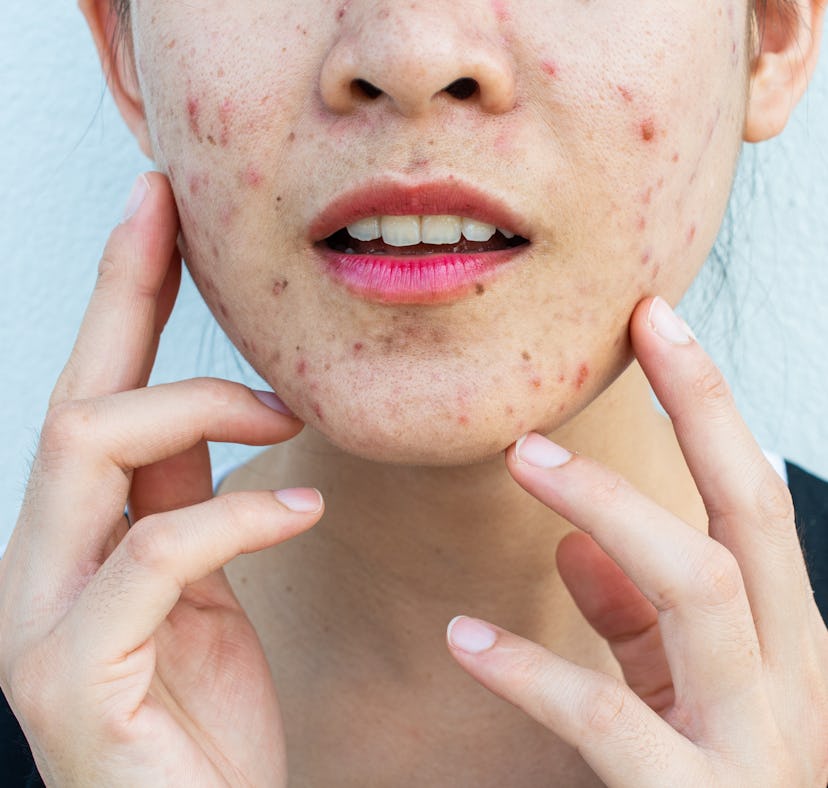
These Expert-Recommended Tips Will Keep All Your Back-To-School Stress Pimples At Bay
Be kind to yourself and your skin.
Stress is objectively the worst. It plays with your mind, can make you sick, and, as if it couldn’t get worse, can even cause acne. With school days fast approaching, stress levels are sure to rise and stay high until winter break. (If you’re on Bama Rush TikTok, you know stress levels are already high for some.) Rather than just accept the pimples that come along, skin care experts are overflowing with helpful tips and tricks to keep any stress acne at bay.
It seems counterintuitive that stress can cause breakouts, because often, breakouts cause stress, which just leads to more stress acne and creates a terrible, painful cycle. It’s totally unfair, but before you get up close and personal with your mirror, dissecting every single spot, there are a few ways to both prevent stress acne and heal it up quickly when it hits. And, all the solutions are easy enough for you to do while still waking up and going to bed at school-appropriate times (not that you will anyway, but you get it).
Stress acne is actually different from other kinds of breakouts you may get, according to experts. There are even a few different kinds of stress that can cause acne, but for the sake of back to school, I’ll focus on emotional stress. Unlike hormonal or dietary stress, celebrity esthetician Joshua Ross from SKINLAB says that emotional stress acne can occur all over the face, including on your cheeks. However, since it the product of overly oily or dirty skin, you have to go about dealing with it in a slightly different way than you might be used to.
What Kind of Acne Is Stress Acne?
As Ross noted, emotionally-driven stress acne has knows no bounds on the face. It can (and likely will) pop up anywhere. But, when it comes to identifying the type of acne you’re dealing with, Texas-based dermatologist Dr. Charles Puza, MD tells Elite Daily that, rather than blackheads or whiteheads, “stress likely tips the acne scales toward more inflammation and those red, juicy pimples.” Truly, there’s nothing worse than those painful, little pus-filled suckers.
Stress Acne Tip 1: Stay Gentle
We only include products that have been independently selected by Elite Daily's editorial team. However, we may receive a portion of sales if you purchase a product through a link in this article.
Rather than take an aggressive approach to combating stress acne, Ross recommends you keep your skin care products gentle. “Astringent toners can stress the skin even more,” he tells Elite Daily. “Choose sensitive skin products that are gentle and fragrance-free with anti-inflammatory ingredients, such as camelia flower extract found in SeSpring So Rich Hydrating Gel ($25, SeSpring) that also helps soothe.”
Stress Acne Tip 2: Skip The Morning Face Wash
Before you just scroll past this rule and deem it not for you, hear the experts out. “Cleansing in the morning is not necessary, and it can stress the skin by altering the skin's natural pH,” Ross says. The last thing your skin needs in these trying times is more stress. Instead, he suggests “starting the day with a splash of water followed by a gentle toner is best. Then, finish off with your normal morning skincare routine: moisturizer, sunscreen, etc. The simpler the better.”
Stress Acne Tip 3: Use A Retinol At Night
Dr. Puza suggests using a moisturizer with retinol in it at night, a powerful ingredient that promotes cell turnover. “Retinoids nightly help to keep the pores open to reduce acne bump formation. Additionally, they help to decrease hyperpigmentation (dark spots),” he says. For those with sensitive skin or who find retinoids are a bit too strong for them, you can exchange retinol for a niacinamide-infused product, which is a bit gentler but delivers similar results. A daily SPF should always be part of your skin care routine, but especially so whenever you’re incorporating retinol.
Stress Acne Tip 4: Try A Targeted Approach
Although you may have been putting in all the hard, preventative work, a zit may still pop up. Or, maybe you’re dealing with a pretty stubborn one. In those moments, Dr. Puza recommends using Clean & Clear’s Advantage Acne Spot Treatment ($8.19, Target). “Once a pimple has formed, the two foundational active ingredients [to treat it] are salicylic acid and benzoyl peroxide,” he says. “Benzoyl peroxide works to kill the acne-causing bacteria. Salicylic acid is a beta-hydroxy acid that helps to decrease pore-clogging oil.” A little acne spot treatment goes a long way, so don’t go too wild — just be diligent about using it.
Stress Acne Tip 5: Relax And Have A Gummy
No, not that kind of gummy. Sometimes, a product that goes deeper than a topical skin care product could be helpful, and that’s where OLLY’s Flawless Complexion Gummies ($13.99, OLLY) come in. First and foremost, you’ll want to consult a medical professional when you’re thinking about adding any sort of dietary supplements to the mix — and they certainly don’t replace a daily multivitamin or a skin care routine. But, if it’s something you and your doctor decide to try, this option is packed with vitamins and minerals that support a healthy complexion.
Experts:
Joshua Ross, celebrity esthetician and founder of SKINLAB
Dr. Charles Puza, MD, Texas-based dermatologist
This article was originally published on